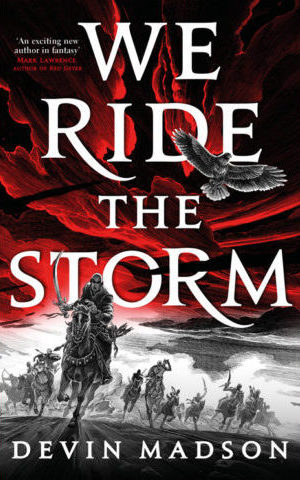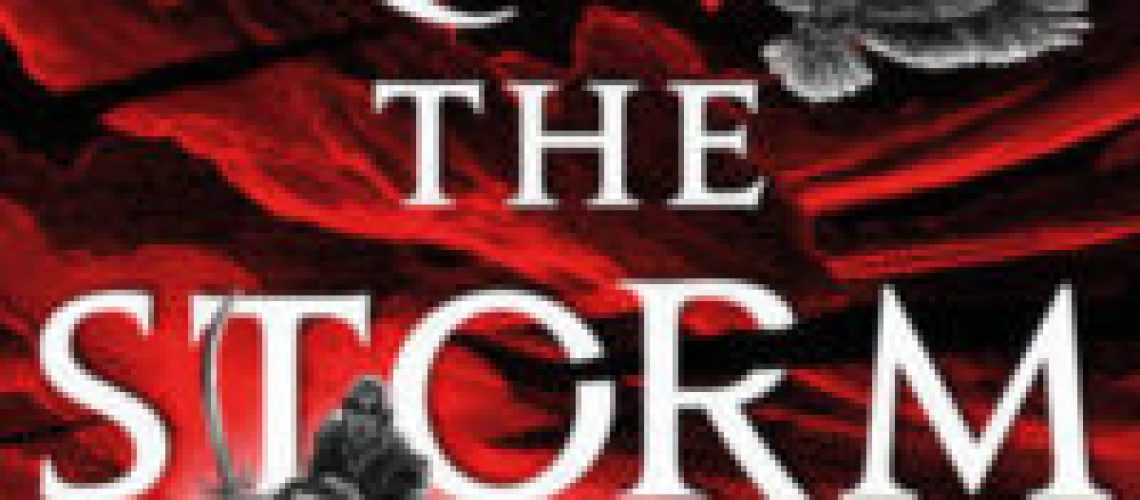We Ride the Storm has author Devin Madson introduce us to the start of a fantasy epic where a tottering Empire’s spin toward disaster is seen through the eyes of a Princess, a warrior, and an assassin with a most unusual gift.
Princess Miko of the Kisian Empire is an untenable position. Descended from the Otako family, she has an uneasy relationship with Emperor Kin Ts’ai, who usurped the throne and is attempting to cement his power. Formally she and her brother are of the Emperor’s family, but the Emperor is surely aware that there are many, even years later, who would flock to an Otako banner. Keeping her autonomy, keeping the chances for her brother alive, and avoiding a purge runs through Miko’s days. When a promise of marriage to try and cement a peace with the dangerous Chiltaens to the north might end Miko’s freedom forever, Or help destroy the empire should the marriage contract fail.
In the meantime, Rah e’Torin, a Levanti exile from the steppe and grasslands his horse riders are from, has a problem, too. His exile, with a group of loyal men and women, have led them into a desolate land to the south, with few signs of Chiltae, their destination. There are stories of former Swords of the steppe coming south to act as mercenaries and riders for the Chiltae, but as the food and water dwindles, Rah and his followers might think they are making a mistake. And when they do meet the Chiltae, their status and role, and the fate of those who migrated before them becomes dangerously, painfully clear.

And then there is Cassandra, where the heart of the supernatural elements of the novel lie. She is a Chiltean who has something like a ghost in her body and soul, a ghost with hopes of her own, and occasionally, power. Cassandra makes a living as an assassin, often posing as a courtesan to do it, has an addiction to a potent and expensive drug to try and forget her troubles, and is not getting any younger. And there is still the person in her head. When offered a chance to try and free herself once and for all, her next contract also leads her into a collision course with the brewing war.
Political intrigue, war, and phat fantasy worldbuilding mark Devin Madson’s We Ride the Storm.
Readers of large scale epic fantasy will recognize a lot of the superstructure here and see how the author handles the form. We have the three above viewpoints, all in a first person past style, and not terribly different on a line by line level, although the mentality and how the three characters think, and there is plenty of introspection, help differentiate the narratives. The three narrators with their plots also give us three different kinds of strands of narrative tension, character development and adventure.
With Miko, we get courtly intrigue and machinations in the very model of a deadly decadent court. When the narrative starts, her hopes are for supporting her brother, supporting the lost legacy of Otako in the wake of the usurper’s rule. It’s a balancing act, an act of weaning masks, deceptions, lies, omissions and misdirection. This is a theme that continues on through the novel in various forms as Miko’s plot rushes toward tragedy and danger.
With Rah, we get the viewpoint of a leader, with a group of fellow Levanti to depend on his leadership and guidance, and his narrative is always about balancing what is good for his group with his own sense of what he thinks he and his group should be, as Levanti. As his narrative goes along, Rah finds his desires, his self identity challenged time and again, a tightening screw that has undeniable consequences for him and those around him.
Cassandra is an assassin, her fights and combats and story are very concentrated, singular and driven in her own way. It might seem that her needs and desires are the most narrow and singular of the trio, she wants her Stiff to drink to forget, she wants the strange entity out of her head. She wants to make a living. Modest goals, but as she is caught into the coils of the overarching plot, she has to find that the goals she wanted are not all that there is, and that the harder she fights, the deeper she winds up in the plot. Her passion and desire, too, help fuel and focus the conflict, just as Rah and Miko do. Assassins caught up in wars often do.
All three of them, too field questions of identity, of who one is and what they should fight for. In looking backwards to the past, and trying to make a future. There are plenty of writing tricks, too, that sometimes I think are a bit overdone that resonate all three strands. All three characters wind up with strange bedfellows as companions at various points, providing echoing, not identical sources of friction between the viewpoint character and those around them. Chases and escapes are a motif that the author loves and uses to drive plot and change along, and how the three characters stand up and act under fire is good characterization as well.
Thus, with a widescreen epic, Madson deftly winds these three narratives with the overarching plot, a clash of powers over an empire which is far more fragile than it first appears. Emperor Kin talks a good game, and after a civil war two decades ago, does seem to have a good hold on power, but the fragility of his position, of the position of Kisia as an empire, become clear right from the start. The decline and fall of empires, the clash of nations is a fire that the author harnesses well and hits the marks on what a readers might hope for in such a novel. In addition to the courtly intrigue, and small scale conflicts tied to the characters, we get excellent executed widescreen panoramas of battle and war. The battle scenes are well written and with a relatively low (or near zero) magic setting, the conflicts feel a lot more like historical fantasy than anything else. The thundering of hooves, the wheel of pikemen, tactics and strategies all play our just as if it were on the fictional game of Errant’s playing board.
One little bit I should have expected but enjoyed nonetheless, given the Australian residency of the author, is that the typical fantasy direction of the north being hot and the south being cold is reversed here. Combined with the cues and my own reading and historical knowledge, the way I conceived of this world is something akin to an upside down China just before the rise of the Mongols, with a ailing empire at the furthest south (the Song), an ambitious and avaricious power north of them (the Liao Empire) and north of them still the unsettled wandering horse lords (the tribes of the Steppe). Even if this is the model Madson was explicitly using, there are plenty of other filips and inventions that make my own conception of the complex politics and world building an approximation on what she has to offer here for readers.
The series’ plot really only is getting going at the end of this novel, the first in a series. This novel is effective in setting up the chess pieces, and setting up the “real” starting conditions of the series. There is enough in this novel for readers who want to see how a fantasy epic gets its gears going and the central conflict and Problem are set up, but it is not a standalone story. And it is a long and detailed on-ramp to get readers up to speed. Madson has put a lot of care and thought into the iceberg of the worldbuilding here and seasoned epic fantasy readers will find a lot to love. I don’t think this is a 101 epic fantasy novel, this is epic fantasy for enthusiasts of the genre, like myself. A couple of the plotting bits niggled at me, but I was otherwise quite delighted with the epic and look forward to the next book.







